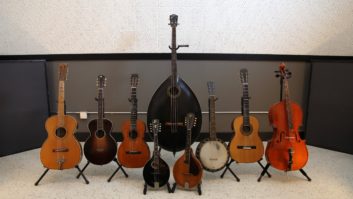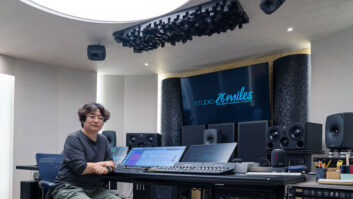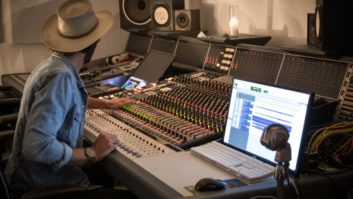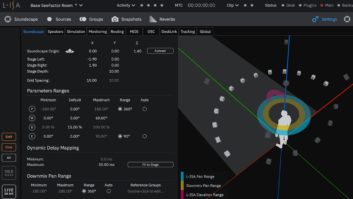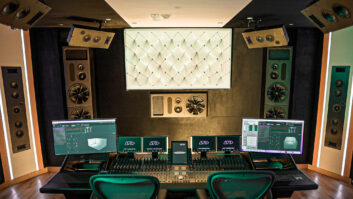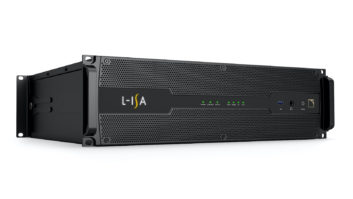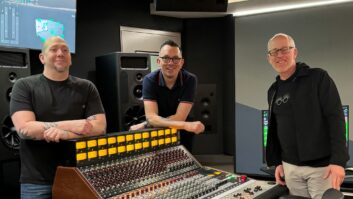Pasadena, CA—Dave Collins Mastering is a singular facility. There’s the man himself, a Grammy Award-winner whose work you have undoubtedly heard if you’ve listened to any music since the 1980s; there’s his mastering console, a unique signal chain of one-offs and custom components dedicated to helping get the artist’s intention across to listeners; and there’s the room, which houses the first U.S. installation of the Northward Systems mastering desk.
The facility, in the middle of a strip of nondescript storefronts in Pasadena, features two rooms—mirror images of each other—designed and built by Collins in consultation with Thomas Jouanjean of Belgium-based Northward Acoustics. Collins, chief mastering engineer at A&M for 14 years through 2002, moved into one room, relocating from his former Hollywood facility. Craig Bauer, another Grammy-winner, whose Hinge Studio in Chicago was Kanye West’s home base in the ’90s, has taken up residence in the other.
Jouanjean’s FTB (Front-to-Back) design philosophy creates a very controlled yet natural acoustical environment, a “quasi-anechoic response speaker-to-room and speaker-to-engineer,” according to Northward’s website. Part of that solution includes Northward’s monitors of choice; both rooms house a pair of soffit-mounted ATC SCM110ASL Pro three-way active speakers.
Inside Fall Out Boy Guitarist Joe Trohman’s Studio, by Strother Bullins, Dec. 8, 2015

Collins reveals that ATC upgraded the tweeters in both rooms after the reference monitors had been installed. “It was fun to have the designer here because, when we were doing some measurements and calibration, he said he’d never seen his speaker perform as well as it does in this room,” Collins says.
The Northward Systems mastering desk is a streamlined, low-profile console with twin roll-around racks. The units are designed to be as acoustically transparent as possible. Collins’ console houses some highly customized gear. “I take these designs, spec them out and have somebody build them for me, to a superb standard,” he says. “It’s basically filters and equalizers. And the signal path really is just straight through.”
The input to the console is a stock Maselec de-esser, a high-pass filter with resonance. “It can cut straight off or have a little peak right before it rolls off,” he says.
Next in line is an analog peak limiter with an insertable audio transformer, then the Davelizer, which offers Baxandall peaking bass and treble control with adjustable and repeatable frequencies. Those are followed by an equalizer designed by the late Barry Porter, co-designer of the Trident A-Range. “His design is by far the most evolved of all the parametrics,” says Collins.
Available compressors include Pendulum Audio’s OCS-2 and ES-8, plus a Magic Death Eye tube unit built by Ian Sefchick, a mastering engineer at Capitol Studios. “It’s an unusual one-off that really sounds great, similar to a Fairchild,” explains Collins. Following that is “an SSL G384 that I took apart and added shorter and longer release times, different VCAs and a little different analog signal path.”
Collins says, “When I started working in pro audio in 1983, the people doing the best work all had custom systems. Look at what Doug Sax was doing; his system was custom in ways that it took me 10 years to understand. It’s one thing I can do that brings a little uniqueness to the project.”

He adds, “I considered Doug a friend; I miss him. He taught me a lot of stuff, and not just about mastering.”
Unlike multichannel recording studio gear, he says, it’s practical to build custom two-channel units for mastering. “It’s been a lot of work, but it’s a lot of fun as well,” he says.
Mastering is a specialized job, Collins observes. “You don’t listen like a recording engineer; you listen to the whole sound at once. And the tools are unbelievable! You can do things today that I would not have thought possible. But you must listen as a fan to the music—and don’t get caught up in all the technology.”
Studio Showcase: Sound City’s Urban Renewal, by Steve Harvey, Aug. 10, 2017
And listen with the computer screen off, he says. “There’s no way you are paying as much attention to listening when you’re looking at the monitor.”
Whatever the type of music, Collins says, he’s listening for anything that’s distracting from the emotional communication. “That’s the job—to be able to figure out which one of those knobs will bring the music closer to the listener.”

Bauer, across the hallway, moved to L.A. from Chicago in 2014, bouncing between various temporary locations until Collins offered him a home in his building. “Dave’s got golden handcuffs on me because this room sounds so good,” he says. “I’d never used ATCs before. When I first came over and listened, the center image was so focused that it threw me. I’d never heard anything like it.”
Although he initially focused on jazz in Chicago and has worked with the likes of Styx and Smashing Pumpkins, Bauer has long been a go-to guy for hip-hop and gospel. He now concentrates solely on mixing, using an Avid S6, and is happy to no longer be recording: “I much prefer to be a guy who doesn’t have to keep hitting play and rewind. I’ve done that long enough,” he says.
Bauer built his original Hinge Studio in Chicago in 1993, where he installed one of the first Euphonix CS2000 digitally-automated analog consoles. In 2008, he had to move to a new Chicago location due to a lease issue. “If you’re going to build a studio, plan on losing it at some point,” he cautions.
Want more stories like this? Subscribe to our newsletter and get it delivered right to your inbox.
In 1997, local rap group The Go-Getters, which included Kanye West, recorded some demos at Hinge. After that, says Bauer, “Kanye worked with me exclusively. Most of College Dropout was tracked at my place, and I mixed most of Late Registration and some of Graduation.”
One recent mix project was for a gospel client, artist and producer Donald Lawrence, with whom Bauer has worked for about 15 years. “We’ve done a record almost every year and every one has been nominated for a Grammy,” he reports. To date, Bauer has received over 35 Grammy nominations and is a two-time Grammy Album of the Year nominee and Grammy Award recipient.
Dave Collins Mastering • www.davecollinsmastering.com
Hinge Studio • www.craigbauer.com
